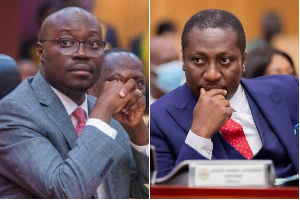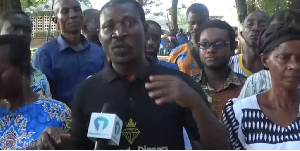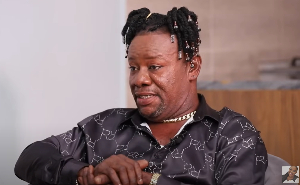Introduction
There is no doubt that Ghana’s economy is currently in a mess and requires a concerted effort from us all to fix it. The second term of Akufo Addo’s presidency does not indicate any clear cut vision or policy approach to transform the country’s current economic predicament, leading to despair and disappointment among many Ghanaians.
Many keep wondering how they will continue to experience and endure another four years of the current status-quo. To inject some confidence in the economy, government must as a matter of urgency resolve to tackle the underlying socio-economic challenges that confront the Ghanaian people as success in this endeavor will confirm Government’s commitment or otherwise in managing the current “crisis economy”.
This article reviews the impact of a freeze in salary increment for the President, Vice President and other government officials and examines whether that is an adequate measure from the Presidency to hasten the recovery of our depressed economy.
Brief Background
Addressing the nation during an event to celebrate Workers’ Day, Saturday, May 1, 2021, the President announced his decision to freeze salary increment for the President, Vice President and other government officials to assist the country to recuperate from the adverse effect the Covid-19 pandemic has had on the economy.
“I have taken the decision to freeze salary increments for this year, 2021 for myself as president, the vice president, ministers, deputy ministers, and all appointees of the executive. It is our modest contribution to reduce the damage to our public revenue and to help hasten our nation’s recovery from the ravages of the pandemic,” he stated.
Whilst it is commendable that the president has shown some leadership in his modest contribution, it must be emphatically stated that that contribution is inadequate to turn our economic situation. Such action may at best be described as a “camouflaged gesture” to suggest that the government is being sensitive when ample evidence abounds to the contrary.
COVID-19 only exposed the weak state of our economy.
In the first place, Ghana’s economy has never been in good shape under this administration. Prior to COVID-19, the economy was damaged and in a free fall. The pandemic only reaffirmed the weak state of the economy.
The financial sector prior to the pandemic shrank by an average of 7.0% per quarter. There was meltdown in the construction sector and decline in electricity growth and other serious challenges in many other sectors.
Also, critical analysis of budgetary allocations as against previous provisions revealed that, over the last four years, allocations to the office of government machinery increased by 71.57%.
Indeed, the poor management of the economy in addition to the 2020 elections resulted in increased cost of government expenditure by about GHS 25 billion and deficit of 11.7% despite suspension of the fiscal responsibility rules for 2020 financial year in accordance with section 31 of the Fiscal Responsibility Act (Act 982), which should have capped the deficit at 5 percent as well as the creation of a “Fiscal Council”.
It must be further noted that, despite constant resort to COVID-19as basis for Ghana’s current economic status as suggested by the President during the May Day Celebrations, Covid-19 only amounted to 2.7% of the GDP.
Thus, it is now left in no doubt that the claim of the government to be better managers of the economy is not supported by their deficit position, as compared to the record of the NDC which recorded deficit of 7.8% of non-rebased GDP as at 2016, in the absence of the Fiscal Responsibility Act (Act 982), and in the face of managing major energy crisis and considering the downturn in global oil prices, government must therefore admit that it resorted to reckless spending on account of the 2020 election.
Mere Salary cut will not grow a weak economy with 0.4% growth in 2020.
The fact is that the economy is weak and cannot support any such increase in salaries. The gesture is not a magnanimous one borne out of good faith to change our current predicament. I am wondering how a freeze in salary increments for the President, Vice President and other Government officials will help stimulate our economy and lead to growth.
Though a good gesture, this would obviously not have been necessary if the economy was in a healthy state. The gesture confirms the weakness of the economy and yet would contribute very little to reversing the trends holding all things constant.
Despite numerous denials by the government, it must be reiterated that Ghana’s economy under the Akufo Addo Government is currently on top speed on a highway to an unknown destination. The economy grew at a rate of 0.4% in 2020, according to the Ghana Statistical Service (GSS), below the government's revised target of 0.9%.
For now the future looks bleak and the gesture of freezing salaries of the President, Vice and other government appointees is not the answer to our predicaments.
Government policy directions do not support their commitment to the people’s welfare.
In spite of the above, the government seems unperturbed and taking Ghanaians for granted while it continues the construction of the cathedral despite the pandemic, and rolling out policies such as placing the portrait of the President and Education Minister in schools.
Indeed as of May 1st, the day the President was making the statement, Ghanaian workers were expecting to pay more money to fill their gas cylinders and transport themselves to work, following an increase in the prices of petrol and liquified petroleum gas, in addition to the lack of portable drinking water flowing through taps coupled with the current energy crisis which has resulted in short supply of power, popularly known as dumsor across the country.
Workers care about the health sector that was promised 88 hospitals and subsequently reviewed ‘Agenda 111’ and the 600 bed hostels that were promised kayayeis which is yet to receive any serious attention.
These matters that bother the ordinary Ghanaian have been relegated to the background which is rather sad considering that the Government should have been accounting to Ghanaian workers on the progress made in shifting the focus of the economy from taxation to production.
As indicated by the President in a tweet on February 18, 2012, “the cost of living and the cost of fuel is the highest in Ghana today”. This is also in spite of claims by the Vice President in a tweet on December 2, 2015 that an NPP Government will not resort to increasing taxes during a period of economic difficulties.
The 504.85% increase in budgetary allocation to the Office of Government machinery shows the government still has so much money and would not need any such salary increment.
In 2020, with staff strength of 1696, the Office of Government Machinery was allocated an amount of GHC136, 212,551.00. In 2021 the staff strength reduced from 1696 to 1597 representing a 5.84% decrease in staff strength. However, the office of Government machinery was allocated GHC823, 880,668.00 representing a 504.85% increase in budgetary allocations over one financial year.
Is the office of government machinery insulated from the impact and effect of COVID-19? Between 2020 and 2021 the office of government machinery has increased their financial allocation by GHC 687,668,117. What would a freeze in salary do therefore?
Instead of the President pretending and creating the impression that he cares about Ghanaian workers, Government must be mindful that workers’ have not enjoyed an increase in salaries as compared to the 504.85% increase in budgetary allocation to the Office of Government Machinery between 2020 and 2021 and 937.73% between 2017 and 2021.
Thus, instead of the President freezing salary increment of Government officials, Government must rather cut budgetary allocations and Government expenditure beginning from the Presidency as demonstrated by President Mahama following 10% reduction in salaries of appointees during a period of downturn in commodity prices on the international market and energy crisis.
Opinions of Sunday, 2 May 2021
Columnist: FX Law and Associates



















